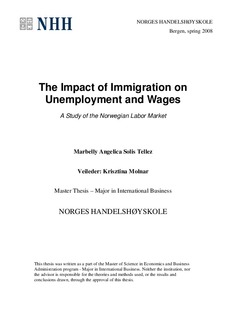The impact of immigration on unemployment and wages : a study of the Norwegian labor market
Master thesis
Permanent lenke
http://hdl.handle.net/11250/168121Utgivelsesdato
2008Metadata
Vis full innførselSamlinger
- Master Thesis [4372]
Sammendrag
According to the United Nations Population Fund (UNFPA), there were 191 million
people living outside their country of birth in 2005. Also, net immigration accounted
for three quarters of population growth during 2000-2005 in developed regions. The
increase in net migration has lead to diverging perspectives on the issue. Accordingly,
debate has increased about the benefits and/or harm from immigration. A suitable
study of the impacts of immigration may enlighten the current debate.
This thesis studies the impact of immigration on wage and unemployment in Norway.
I present a set of theories that explain the effect of immigration on the host economy.
The theories presented will be assessed from a Norwegian perspective. The study also
includes a summary of Norwegian immigration and economy history with focus on
the developments in 2001-2006. The summary forms the base for further analysis.
Regression analysis was used to test the significance of changes in unemployment and
wage using different independent variables. The results showed that the effects do not
have enough statistical significance to say that immigration bids down wages and
raises unemployment. After finding no statistical significance, a qualitative analysis
and evaluation of the immigration and economic history of Norway is done to
determine whether the changes in unemployment and wages during the period of
study can be explained by changes in economic trends and indicators.
The results presented have implications for the development of immigration policies.
Thus, the current Norwegian immigration policies are evaluated and discussed to
determine their wisdom or otherwise based on the statistical findings.
